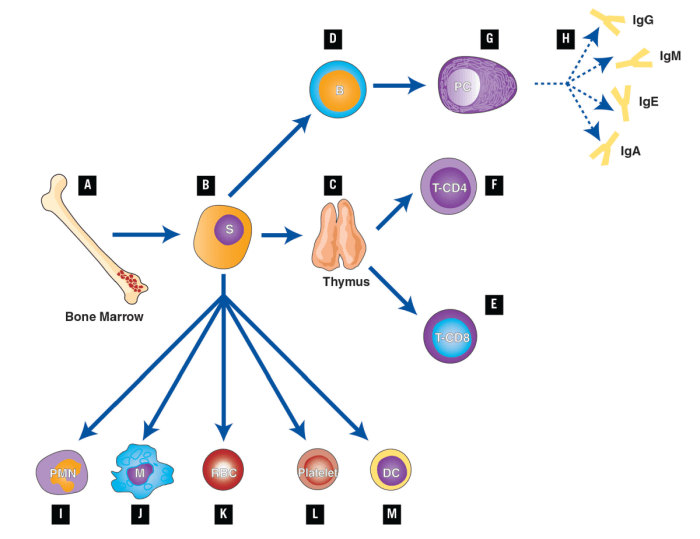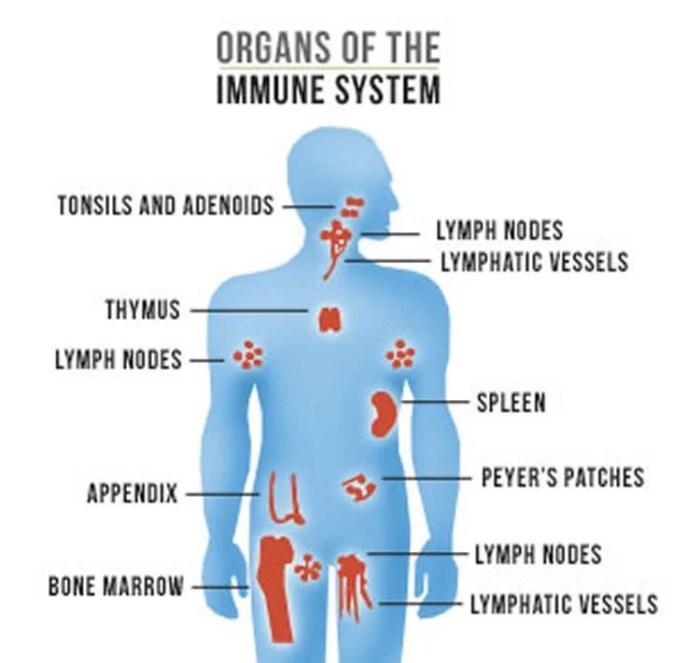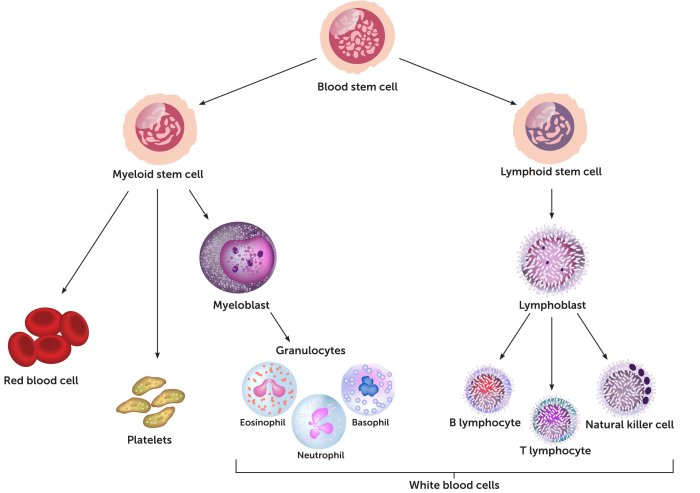As Pharm Made Easy Immune System takes center stage, this opening passage beckons readers into a world crafted with insightful knowledge, ensuring a reading experience that is both absorbing and distinctly original.
The immune system, a remarkable defense mechanism, safeguards our bodies against a myriad of threats. Join us as we delve into the intricacies of this intricate system and explore the ways in which pharmacy plays a crucial role in bolstering its functionality.
Introduction to the Immune System
The immune system is a complex network of cells, tissues, and organs that work together to protect the body from infection and disease. It is divided into two main branches: the innate immune system and the adaptive immune system.The innate immune system is the first line of defense against infection.
It is made up of physical barriers, such as the skin and mucous membranes, as well as chemical barriers, such as stomach acid. The innate immune system also includes cells that can recognize and destroy foreign invaders, such as bacteria and viruses.The
adaptive immune system is more specific than the innate immune system. It is made up of cells that can recognize and destroy specific pathogens. The adaptive immune system also includes cells that can remember past infections, so that the body can mount a faster and more effective response to future infections.Antibodies
are proteins that are produced by the adaptive immune system. They are designed to bind to specific pathogens and neutralize them. White blood cells are cells that are part of the innate and adaptive immune systems. They can recognize and destroy foreign invaders, and they can also produce antibodies.
Role of Pharmacy in Immune System Health
Pharmacists play a vital role in promoting immune system health. They are knowledgeable about various immune-supporting supplements and medications and can provide personalized recommendations based on an individual’s health needs and risk factors. Pharmacists can also assess and monitor immune function through blood tests and other diagnostic tools, helping to identify potential deficiencies or imbalances.
Personalized Recommendations for Immune Support
Pharmacists can tailor immune support recommendations based on an individual’s age, lifestyle, and medical history. For example, they may suggest probiotics for individuals with digestive issues or recommend vitamin D supplements for those living in regions with limited sunlight exposure.
Pharmacists can also provide guidance on healthy lifestyle choices, such as proper nutrition, regular exercise, and adequate sleep, which are crucial for maintaining a robust immune system.
Pharmaceutical Interventions for Immune System Enhancement

The pharmaceutical industry offers a wide range of interventions designed to enhance immune function, from prescription medications to over-the-counter supplements. These interventions can strengthen the body’s defenses against pathogens and promote overall health.
Prescription Medications
- Immunosuppressants:Used to suppress the immune system in patients with autoimmune disorders or after organ transplants. Examples include cyclosporine, tacrolimus, and azathioprine.
- Immunomodulators:Regulate the immune system’s response to specific antigens. Examples include interferon-alpha, glatiramer acetate, and natalizumab.
- Antivirals:Target specific viruses to inhibit their replication and spread. Examples include acyclovir, valacyclovir, and oseltamivir.
- Antibacterials:Kill or inhibit the growth of bacteria. Examples include penicillin, amoxicillin, and ciprofloxacin.
- Antifungals:Target fungal infections. Examples include fluconazole, itraconazole, and terbinafine.
These medications are typically prescribed by a healthcare professional and require careful monitoring due to potential side effects, which may include nausea, vomiting, diarrhea, and allergic reactions.
Over-the-Counter Supplements
- Vitamin C:An antioxidant that supports immune cell function.
- Vitamin D:Regulates immune responses and reduces inflammation.
- Zinc:Essential for immune cell development and function.
- Echinacea:An herbal supplement with antiviral and antibacterial properties.
- Probiotics:Beneficial bacteria that support a healthy gut microbiome and boost immunity.
While these supplements are generally considered safe, it’s important to consult a healthcare professional before taking them, as they may interact with other medications or have potential side effects.
Role of Vaccines, Pharm made easy immune system
Vaccines are an essential tool for strengthening the immune system. They introduce weakened or inactivated pathogens into the body, stimulating the immune system to produce antibodies and memory cells. These cells can then quickly recognize and respond to future infections with the same pathogen, preventing or mitigating illness.
Natural Approaches to Immune System Support

The immune system is a complex network of cells, tissues, and organs that work together to defend the body from infection. While modern medicine has developed effective treatments for many diseases, there are also a number of natural approaches that can help to support immune function.
Diet
A healthy diet is essential for overall health, including immune function. Some specific nutrients that are important for immune health include:
- Vitamin C: Vitamin C is an antioxidant that helps to protect cells from damage. It is also necessary for the production of white blood cells, which are essential for fighting infection.
- Vitamin E: Vitamin E is another antioxidant that helps to protect cells from damage. It also helps to boost the activity of white blood cells.
- Zinc: Zinc is a mineral that is essential for the production of white blood cells. It also helps to protect cells from damage.
- Selenium: Selenium is a mineral that is essential for the production of antibodies, which are proteins that help to fight infection.
In addition to these specific nutrients, a healthy diet should also include plenty of fruits, vegetables, and whole grains. These foods are all good sources of antioxidants and other nutrients that can help to support immune function.
Exercise
Exercise is another important way to support immune function. Exercise helps to increase blood flow, which helps to deliver oxygen and nutrients to immune cells. Exercise also helps to reduce stress, which can have a negative impact on immune function.
Aim for at least 30 minutes of moderate-intensity exercise most days of the week. If you are new to exercise, start slowly and gradually increase the intensity and duration of your workouts over time.
Stress Management
Stress can have a negative impact on immune function. When you are stressed, your body produces hormones that can suppress the immune system. This can make you more susceptible to infection.
There are a number of different ways to manage stress, including:
- Exercise: Exercise is a great way to reduce stress. It helps to release endorphins, which have mood-boosting effects.
- Yoga: Yoga is a mind-body practice that can help to reduce stress and improve overall well-being.
- Meditation: Meditation is a practice that can help to calm the mind and reduce stress.
- Spending time in nature: Spending time in nature has been shown to reduce stress and improve mood.
If you are feeling stressed, try incorporating some of these stress-reducing techniques into your daily routine.
Other Natural Approaches
There are a number of other natural approaches that may help to support immune function, including:
- Echinacea: Echinacea is an herb that has been shown to have immune-boosting effects. It is available in capsule, tea, and tincture form.
- Elderberries: Elderberries are a fruit that is rich in antioxidants. They have been shown to have antiviral and antibacterial effects.
- Green tea: Green tea contains antioxidants that have been shown to boost immune function.
- Probiotics: Probiotics are live bacteria that have health benefits. They can help to improve gut health, which can have a positive impact on immune function.
Talk to your doctor before taking any supplements or using any other natural approaches to support immune function.
Immune System Disorders and Pharmacological Management: Pharm Made Easy Immune System

The immune system is a complex network of cells, tissues, and organs that work together to protect the body from infection and disease. However, sometimes the immune system can malfunction, leading to disorders that can range from mild to life-threatening.
Immune system disorders can be classified into three main types: allergies, autoimmune diseases, and immunodeficiencies. Allergies are caused by an overreaction of the immune system to a foreign substance, such as pollen or pet dander. Autoimmune diseases occur when the immune system mistakenly attacks the body’s own tissues.
Immunodeficiencies are characterized by a weakened immune system that is unable to fight off infections effectively.
Maintaining a strong immune system is crucial for overall well-being. Pharm Made Easy provides comprehensive information on how to boost your immunity naturally. If you’re looking for a convenient and effective way to enhance your immune system, consider Splendid Greens Cava . This superfood supplement is packed with antioxidants, vitamins, and minerals that work together to support your body’s natural defenses.
By incorporating Pharm Made Easy’s guidance and Splendid Greens Cava into your routine, you can strengthen your immune system and enjoy optimal health.
Pharmacological Approaches to Treating Immune System Disorders
The treatment of immune system disorders depends on the specific disorder and its severity. In some cases, lifestyle changes, such as avoiding allergens or getting enough sleep, may be enough to manage the condition. In other cases, medication may be necessary.
There are a variety of medications that can be used to treat immune system disorders. These medications can be used to suppress the immune system, boost the immune system, or target specific components of the immune system.
It is important to note that immune system disorders can be complex and difficult to treat. Early diagnosis and appropriate medical intervention are essential for managing these conditions and improving the quality of life for those affected.
Case Studies and Patient Education

Understanding the intricate workings of the immune system and its significance in maintaining overall health is crucial. To further enhance this knowledge, we present real-world case studies that exemplify the profound impact of pharmaceutical interventions on immune system health. Additionally, we delve into the creation of patient education materials, providing clear and concise information about immune function and its support.
Role of Pharmacists in Patient Education
Pharmacists play a pivotal role in educating patients about immune system health and disease management. Their expertise enables them to provide personalized guidance, ensuring patients understand the importance of maintaining a robust immune system and the appropriate use of medications to support it.
Quick FAQs
What is the immune system?
The immune system is a complex network of cells, tissues, and organs that work together to protect the body from infection and disease.
How can pharmacy help improve my immune system?
Pharmacists can assess your immune function, recommend supplements and medications, and provide guidance on lifestyle changes that can support immune health.
What are some natural ways to boost my immune system?
Eating a healthy diet, getting regular exercise, and managing stress can all contribute to a stronger immune system.